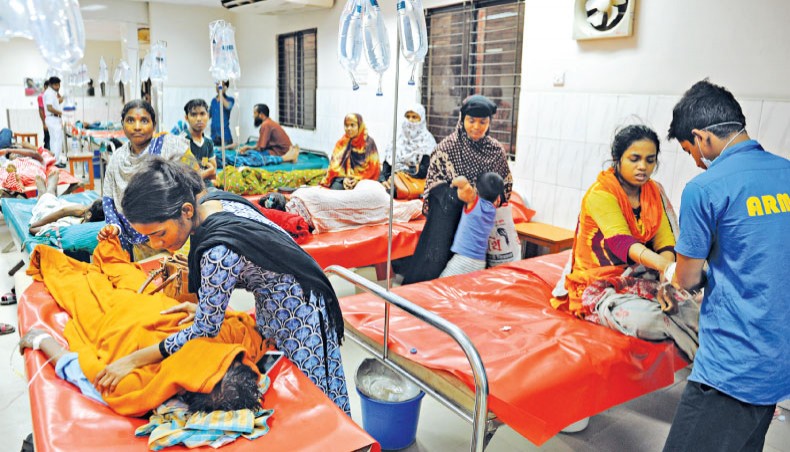Sudden surge in diarrhoea patients in capital
The number of diarrhoea patients rose suddenly in and around the capital with the advent of summer.
Hospitals in the capital are struggling to grapple with the sudden surge of diarrhoea patients since the start of April.The International Centre for Diarrhoeal Disease Research, Bangladesh already overflows with diarrhoea patients, mostly from Jatrabari, Lalbagh, Mirpur, Mohammadpur, Motijheel, Ramna, Uttara, Tejgaon as well as from Keraniganj, Tongi, Gazipur and the other nearby areas, shows the ICDDR,B registry.
Severely dehydrated acute diarrhoea patients, mostly children below 10, were brought to the ICDDR,B.
At the ICDDR,B admitted diarrhoea patients now outnumbered in any previous 10 years, doctors told New Age on Sunday.
On April 3 alone 751 diarrhoea patients were admitted to the ICDDR,B, surpassing the average spanning 300 and 450.
On Friday, 788 patients were admitted to the ICDDR,B and 735 on Saturday, 732 on Sunday.
Doctors felt amazed over the sudden spate in diarrhoea incidence this year even before the temperatures soared to the level it could be called heat wave.
They blamed the capital’s polluted water supply for the unexpected rise in diarrhoea patients.
The doctors at the ICDDR,B were seen struggling to cope with the huge flow of patients, New Age found during visits to the hospital on Sunday and Monday.
‘One patient arrives in less than every two-minute,’ said senior field officer Dr Toma Khan, who was among a group of doctors specially called to attend diarrhoea patients.
ICDDR,B chief scientist Azharul Islam expressed fears that the number of diarrhoea patients would swell in the coming days.
He told New Age that the unexpected rise in diarrhoea patients even before sweltering summer set in was quite unprecedented.
‘The problem lies with the water supply,’ was Azhar’s reply to the question why the incidence of diarrhoea increased when it should not.
In 2007 also, he said, the ICDDR,B treated a comparable number of diarrhoea patients.
To be able to accommodate the rush of diarrhoea patients the ICDDR,B set up beds even at its lobby, corridors and at the study area.
Rezaul Karim brought his wife and 3-year old baby, both diarrhoea patients, all the way from Jurain where he lives.
‘My wife has been suffering from diarrhoea for the last two days and today our baby got it,’ he told New Age.
Reza said that Jurain get polluted water supply.
‘Even after boiling the dark waters we get cannot be used for the odor,’ he said.
Worried company executive Niaz Uddin was seen seeking doctor’s help for his 20-month old baby.
He told New Age that infected by diarrhoea, his baby has been vomiting for the last two days.
Water supplied to several areas in the capital being unsafe for drinking has been causing immense sufferings to people.
People complained from many areas that the scanty water supply they get from WASA after long intervals is unusable as it was mostly polluted.
Dhaka WASA managing director Taqsem A Khan denied the allegations.
He said that there was no shortage of water for supplying to the consumers as DWASA produces 244 crore litres of water every day against the demand varying between 235 and 240 crore litres in the capital.
But he did not rule out the possibility of leakages in the pipelines causing the supply of smelly water.
Azhar advised people to use safe water alone and to keep oral rehydration saline at home for providing relief to diarrhoea patients.
He also advised all to avoid consumption of stale foods and uncovered foods and drinks sold on the waysides.
He said that only warm food should be taken to minimize the possibility of diarrhoea infection.
Azhar advised people to consult doctors in the event of any family member suffering from acute diarrhoea.
He said that the ICDDR,B treats diarrhoea patients free of cost and it never refuses to attend to them.
News Courtesy: www.newagebd.net











